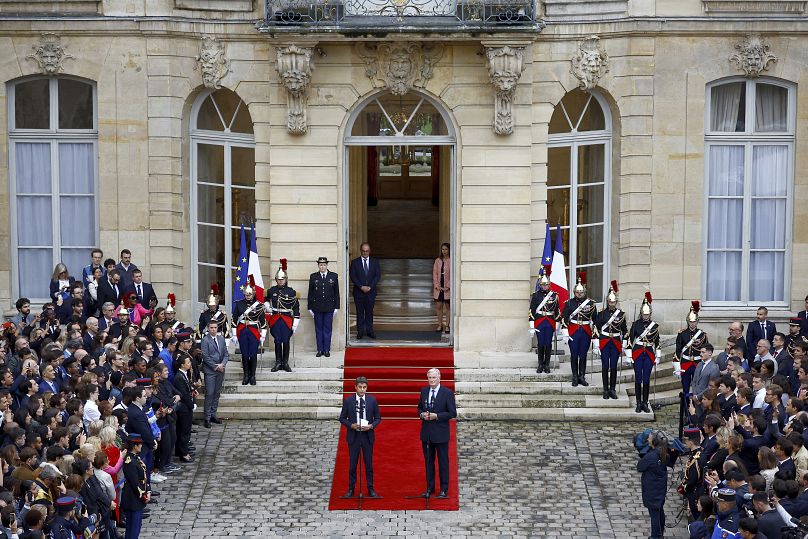President Emmanuel Macron named Michel Barnier as France's new prime minister on Thursday, hoping the Brexit negotiator and veteran conservative can work with the country's bitterly divided legislature and end the political turmoil that has roiled Macron's presidency.
Michel Barnier has promised to respond to the "anger" of the people in his first speech as prime minister of France.
 ADVERTISEMENT
ADVERTISEMENT
 ADVERTISEMENT
ADVERTISEMENT
Speaking at the handover ceremony with his predecessor Gabriel Attal in Paris, Barnier said his new role would concentrate on fixing a raft of problems causing resentment among French voters.
"It will be about responding as much as we can to the challenges, anger that you talked about, to the suffering, to the feeling of abandonment, the injustice that runs, far too much, through our cities, our neighbourhoods and our countryside," he said.
President Emmanuel Macron named Barnier as prime minister on Thursday, hoping the veteran conservative can work with the country's bitterly divided legislature and end the political turmoil that has roiled Macron's presidency.
At 73, Barnier is the oldest of the 26 prime ministers that have served modern France's Fifth Republic.
He replaces the youngest, Gabriel Attal, who was 34 when he was appointed just eight months ago.
He's a loyal veteran of the recently renamed right-wing Republican party (LR) and has had a long political career in France and the EU, having served twice as European commissioner and, between 2016 and 2021, the chief EU negotiator for the UK's exit from the bloc.
Barnier's appointment ends more than 50 days of a caretaker government in France but offers no guarantee of a return to political calm.
The current National Assembly is divided into three blocs: the left-wing coalition NFP (that won the most seats but fell short of an absolute majority), Macron's centrist group and the far-right National Rally.
And he faces the tough task of having to work with that acrimonious and deeply divided hung parliament that emerged from an early legislative election Macron called in June.
"With Michel Barnier in Matignon [the official residence of the French prime minister] as prime minister, the president remains clearly in power," said political analyst, Dominique Moisi. "He's not challenged by his prime minister."
"The extreme moderation and conciliatory character of his prime minister is a plus for the president, not necessarily for the French who have voted for the left and who are feeling betrayed," she added.
Barnier will now have to survive a confidence vote in the National Assembly, France's lower house of the parliament.
In choosing Barnier, Macron might have inevitably strengthened the hand of the National Rally and given it the role of kingmaker, experts believe. But the left's importance should not be dismissed if Barnier is to take on the hot seat of prime minister.
Emmanuel Rivière, political scientist and polling expert, told Euronews that France currently has three major political players: Macron, left-wing Jean-Luc Mélenchon and the National Rally's Marine Le Pen.
"And there are two who are considered to be making a mess of things," he said. "It's just an extra step that helps to give more credibility to the far-right."
If he survives the confidence vote, the new head of government will have to get straight to work: first, France must submit its proposals to slash public spending to the EU by 20 September, though that deadline can be extended until October.
To comply with EU rules, France would need to make cuts of at least €30 billion in 2025.
Then, a draft of the country's budget for 2025 is due to be presented to Parliament on 1 October, at a time when France's public finances are in dire straits.











